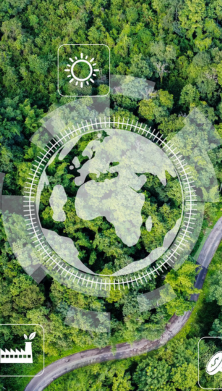When the treads on your favorite pair of running shoes finally wear out, you can reincarnate them as a running track. Most sport shoes manufacturers now recycle their products, but Nike lead the charge in the early 1990s when it introduced its Reuse-a-shoe program. Under its approach, up to 1.5 million pairs of old shoes (not only Nike) are sliced and diced annually into Nike Grind, a material used in creating athletic and playground surfaces.
The sports industry is not alone in trying to close the loop on the product life cycle. Walkers, a British snack food brand, recently launched a plastic recycling program after a social media campaign saw the company swamped with empty packets of crisps. H&M, Zara and Levi’s all accept old clothes in return for discount vouchers, while The Body Shop offers rewards for returning its empty bottle, tubs and pots.
The circle of virtue
Across industries, companies are in a competition to minimize consumption of finite resources and design out waste and pollution from past modes of production. Known as a circular economy, the concept sees them seeking to create value from waste by transferring it into materials that can be used and reused as opposed to the traditional ‘take, make and dispose’ model of production.
“Companies are increasingly realizing that waste can be a value stream,” says Chris Bonnet, Head of ESG Business Services at Allianz Global Corporate & Specialty (AGCS). “Sometimes they are being pushed by public pressure, but there is a growing realization of the impact that traditional business approaches have had on the environment.”
Oceans full of plastic waste, species extinction, the clear felling of the Amazon and the ravages of climate change are just the most obvious examples of the deterioration our world. Part of the solution to these problems involve innovative approaches to business, such as the circular economy.
Growing environmental awareness is evident in the AGCS Trend Compass 2019, a strategic tool identifying the most important technological, business and socio-economic developments of the next five to 15 years in six different categories, including Artificial Intelligence, Socio Economy, IT Infrastructure and Cities & Mobility. To compile the Trend Compass, more than 200 AGCS managers and risk experts identified and ranked 25 important trends in terms of the impact they will have on business.
Trends that are a reaction to environmental concerns loom large. There are three notable climate change-linked trends evident: An area considered as needing immediate action from companies is ‘green mobility’, while the ‘circular economy’ and ‘smart cities’ will require adoption within the next five to seven years.
Behind each of these trends, says Bonnet, is a growing realization that firms face consumer criticism, reputational damage as well increasing regulatory and legal action, particularly concerning climate change. However, there is also a growing sense of awareness that the negative effects of a global warming above 2 degrees Celcius will have a dramatic impact on bottom line results and business operations and even become an existential threat for businesses and societies.

Soul-wrenching impacts
Global warming fuels extreme calamities worldwide and threatens business. Rising seas, drier droughts, fiercer storms and massive flooding pose physical threats to firms because they imperil factories and other assets, as well as transport and energy links that tie the entire supply chain together.
“Climate change is often presented as an issue for tomorrow with global warming paths calculated for the end of the century. But this perspective is swiftly changing,” says Amer Ahmed, CEO of Allianz SE Reinsurance. “A focus in public discourse on a ‘climate crisis’ or ‘climate emergency’ is emphasizing the toll our society is already paying today.”
Allianz RE provides an annual award to researchers into climate change, as well as solutions to mitigate the effects. “As risk-carriers, insurers have skin in the game,” he explains. “And the climate crisis is already impacting our business.”
As an example, 2017 was a year of particularly significant catastrophes. Houston experienced its third “500-year flood” in less than four decades, while California suffered five of its 20 most destructive wildfires ever.
Meanwhile, 41 million in Bangladesh, India and Nepal were affected by flooding and monsoon rains, but commercial traffic on the Rhine, the world’s busiest waterway, was stranded when waters reached a historic low.
All of this is having a soul-wrenching human cost. According to a recent report from Climate Transparency there are 16,000 fatalities in G20 economies due extreme weather events every year. The economic impact is estimated to be $142 billion annually.

Sustainable growth
Chris Bonnet believes the greater sense of urgency on climate change is reflected in corporate agendas. With companies increasingly being held accountable for how their operations impact on the environment, natural resources and the climate of our planet, corporate sustainability is being taken far more seriously.
Apart from the circular economy, green mobility is another trend identified by the Compass that is inspired by climate concerns. Describing developments and measures to shift mobility away from fossil fuels and onto more sustainable approaches (such as using electricity or biofuels) to sink CO2 emissions, AGCS says green mobility will have a very high impact on business within the next five years.
For example, all European countries must ensure that at least 10% of their transport fuels come from renewable sources by 2020. This will have significant implications for the supply chain. While regulation is prompting the move, many companies are already switching out their fleets.
For firms looking to demonstrate their ESG (environmental, social and governance) credentials, switching fleets indicates they are taking responsibility for the negative impact of their business on stakeholders and communities. This can help to strengthen brand values and create a competitive advantage, while helping the bottom line through the lower operating costs that electric vehicles offer over a fuel burning fleet.
Bonnet, who conducted A Business Sector Analysis of Natural Capital Risk, a recent study on the natural capital risks facing selected sectors, explains that sustainable use of natural resources is critical for the future success of most businesses.
“Natural resources such as clean air and fresh water are vital for businesses – and at the same time massively at risk across many industry sectors today. Yet while corporates’ awareness of their natural capital footprint is growing, many still need to gain a better understanding of the specific threats that can impact their industry sector and company in particular,” Bonnet says.
Smart living, smart cities

Green mobility overlaps with a broader, coming trend noted in the Compass – smart cities. The term was popularized from 2010, when IBM launched its ‘Smarter Cities Challenge’ encouraging municipalities to use data collection and analysis to plan and run cities more efficiently. IBM and other technology firms developed ICT systems that capture (real-time) data about how residents use city infrastructure like transport networks. This enables city authorities to respond accordingly, for example by modifying traffic light signals to ease congestion.
In recent years, politicians, city planners and civil society have expanded the smart city concept, adding dimensions such as environmental sustainability, according to their circumstances and priorities. Measures such as energy-saving building construction, reducing inner city traffic as well as recycling water, building materials and waste will minimize the urban carbon footprint. The local production of energy and food also reduces transport and CO₂ emissions.
Allianz is fully committed to promoting the global transition toward a low-carbon economy
Allianz is fully committed to promoting the global transition toward a low-carbon economy, Recognizing that averting catastrophic climate changes requires a rapid and full de-carbonization of the economy, Allianz has committing to set long-term climate goals for its operations and proprietary investments in line with the Paris Climate Agreement.
In underwriting, Allianz withdrew from insuring single coal-fired power plants and coal mines in operation or planning and is committed to a full phase-out of all coal-based business models from proprietary investments and Property & Casualty insurance portfolios by 2040.
Allianz has also committed to source 100% of our global electricity needs from renewable sources by 2023 and lead a coalition of asset owners to invest more than EUR 2 trillion in climate-neutral investments by 2050.
Our experts
Amer Ahmed, CEO of Allianz SE Reinsurance
Chris Bonnet, Head of ESG Business Services at Allianz Global Corporate & Specialty (AGCS)















